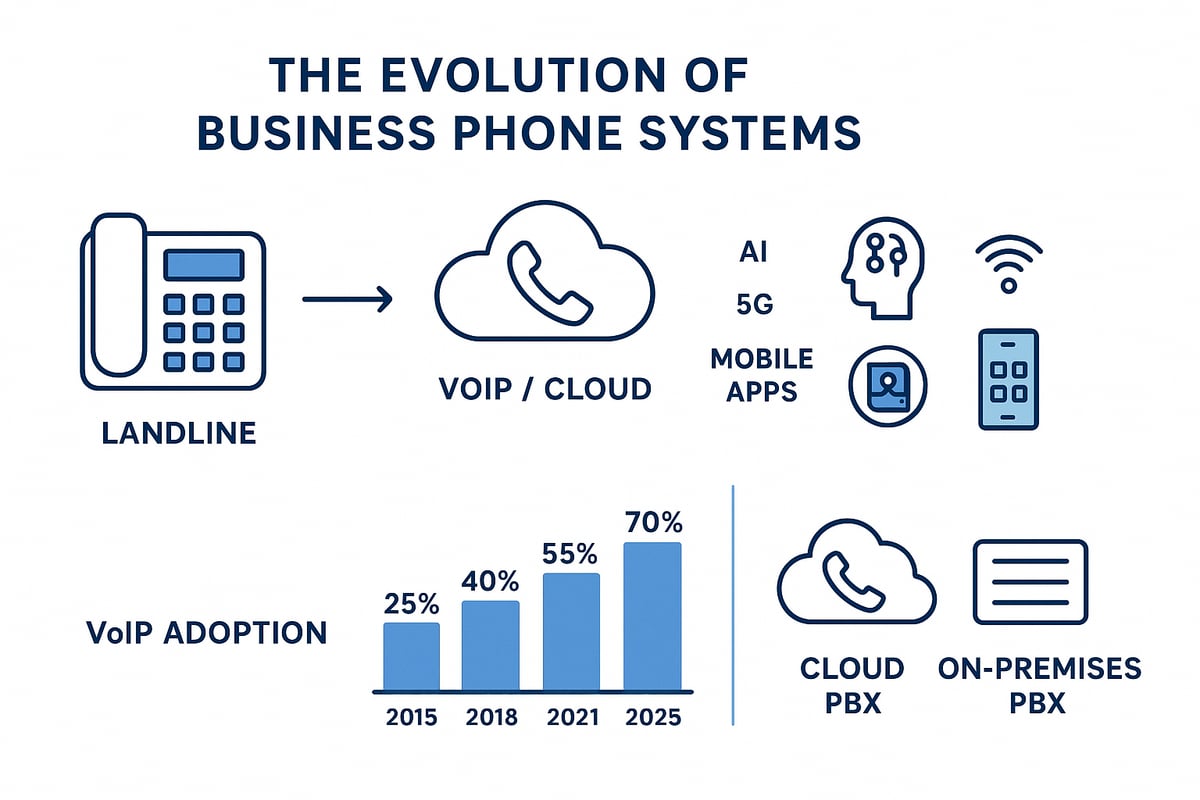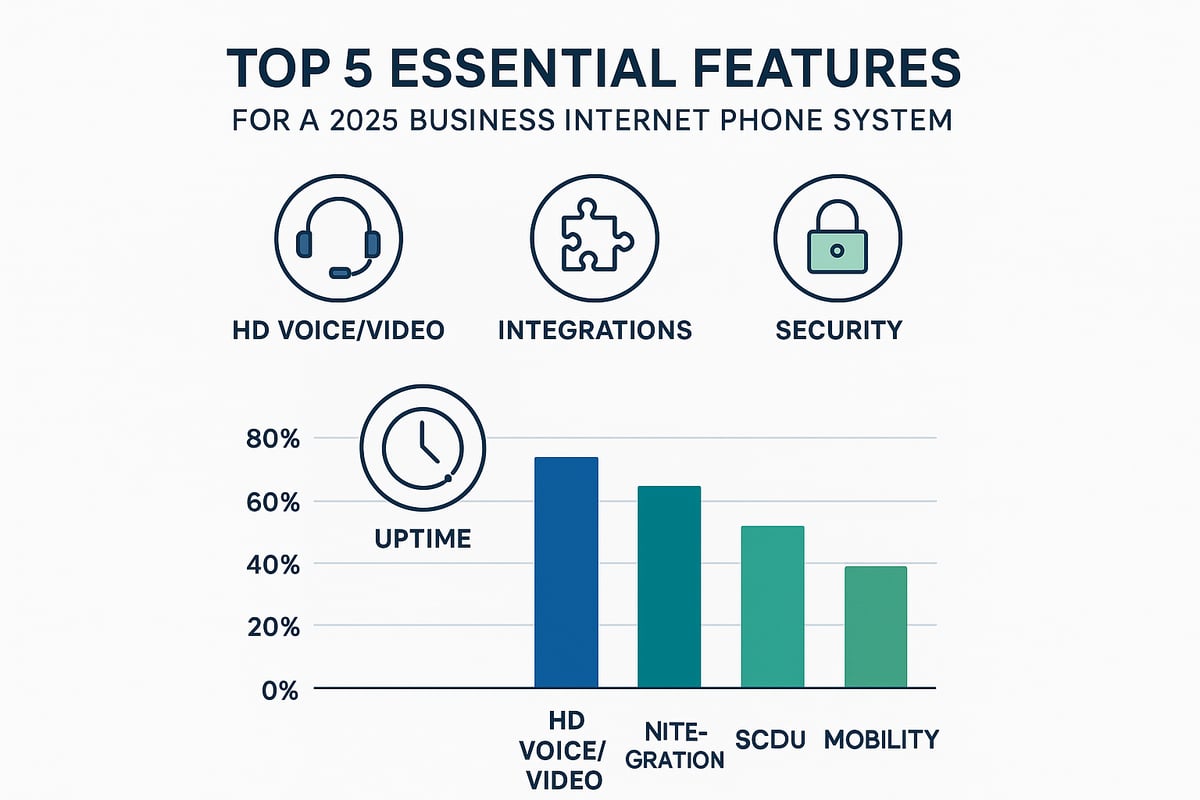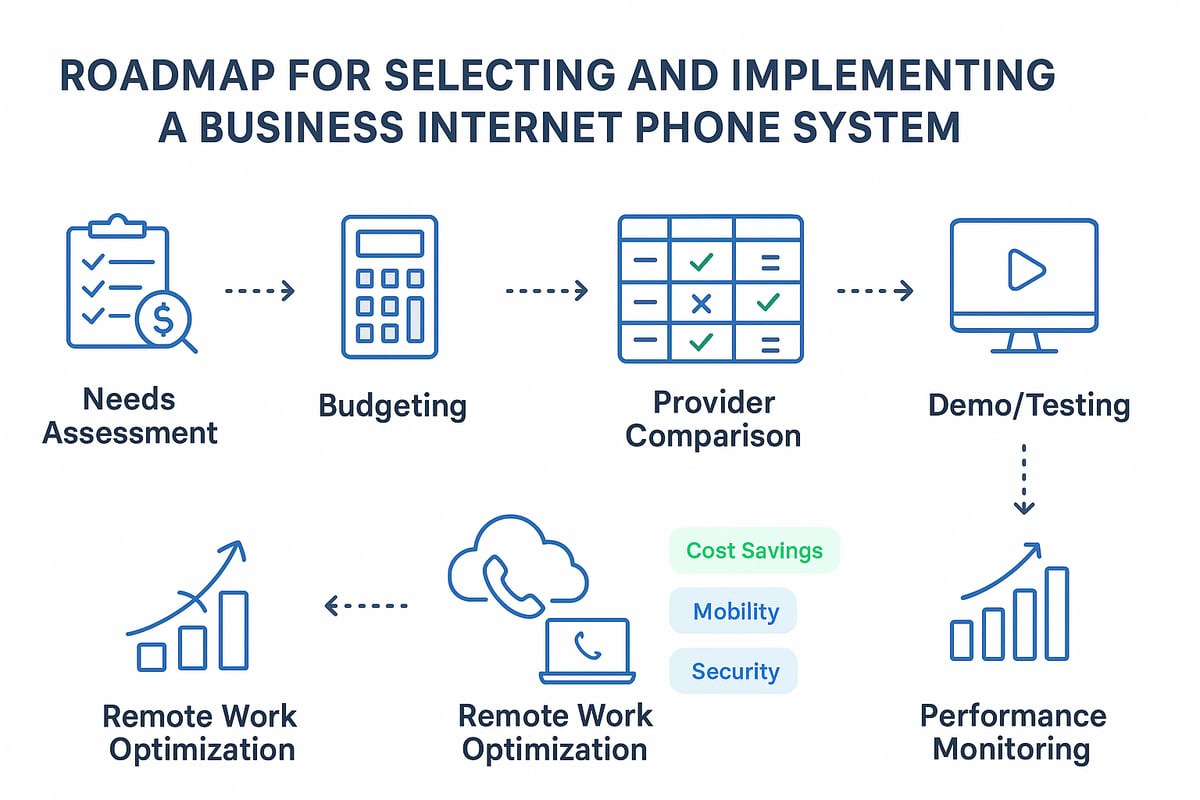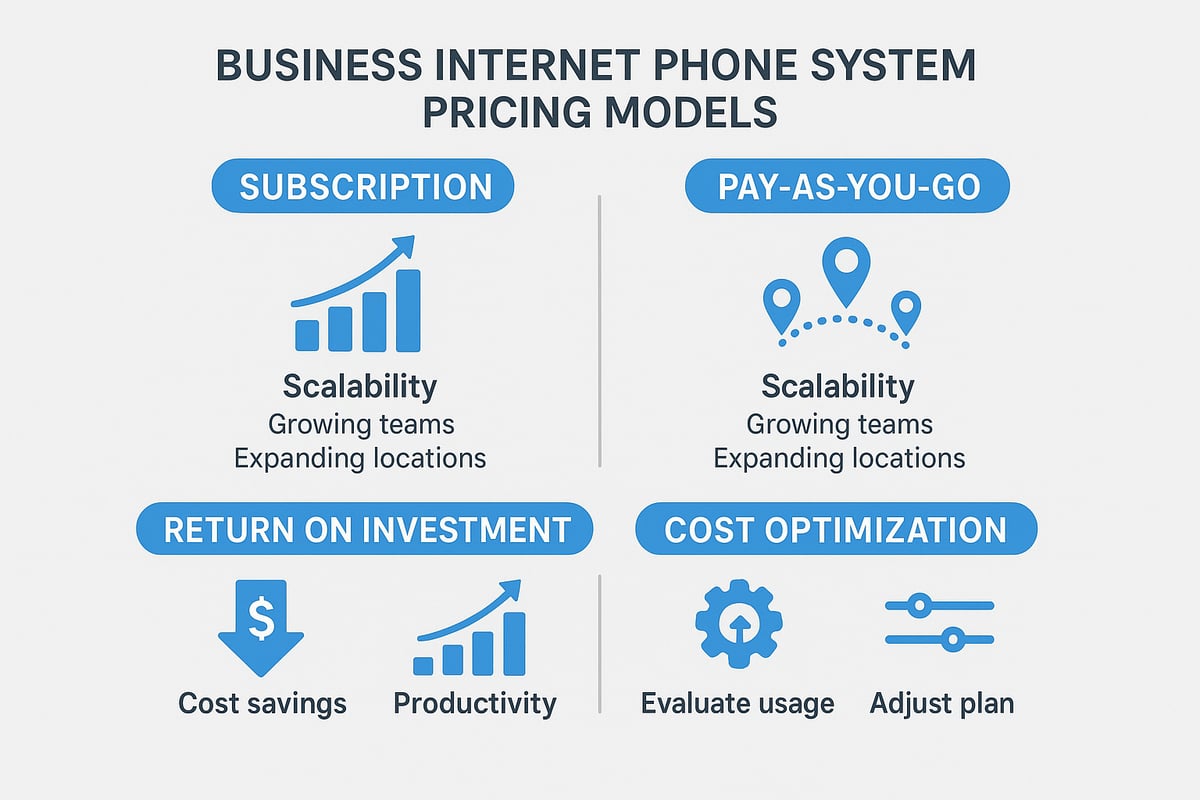Business Internet Phone System Guide for Success in 2025
Master the business internet phone system landscape in 2025 with expert guidance on selection, deployment, features, security, and ROI for lasting success.
Redaction
17/10/2025, 12:30:00In 2025, adopting the right business internet phone system is a decisive step for companies looking to stay ahead in a fast-changing digital world. The right solution transforms how teams connect, collaborate, and serve customers.
This guide is your roadmap for selecting, deploying, and optimizing a business internet phone system. You will discover the latest trends, must-have features, step-by-step implementation strategies, cost considerations, security essentials, and future-proofing tactics.
Explore how innovative phone systems drive business growth, streamline operations, and safeguard your communications. Ready to unlock your company's full potential? Let’s begin your journey toward communication success.
Understanding Business Internet Phone Systems in 2025
In 2025, the business internet phone system is at the heart of modern enterprise communications. Companies are moving beyond traditional setups, seeking agile, scalable solutions that support evolving work models and digital transformation. Understanding how these systems have changed, and what they now offer, is crucial to making the right choice for your business.

Evolution of Business Phone Systems
The business internet phone system has undergone a dramatic transformation over the past decade. Companies have shifted from legacy landline networks to VoIP and cloud-based options, attracted by flexibility and lower costs. The rapid adoption of remote and hybrid work has made reliable digital communication non-negotiable.
Unified communications platforms are now the norm, combining voice, video, and messaging to streamline workflows. According to TechRepublic, 60% of businesses use VoIP today. Small and medium businesses, in particular, have embraced cloud telephony to reduce expenses and simplify management. For a deeper comparison, see this Landline vs. business VoIP systems resource.
Key Technologies Shaping 2025
Modern business internet phone system deployments are defined by cutting-edge technology. Artificial intelligence powers smart call routing, real-time analytics, and even virtual receptionists that can handle basic inquiries without human intervention.
Integration is another priority. Tools like Slack, Microsoft Teams, and CRM platforms now connect directly to phone systems, creating seamless communication. With 5G and advanced connectivity, businesses enjoy crystal-clear calls and minimal lag. Browser-based and mobile-first solutions enable staff to work from anywhere without missing a beat.
Types of Business Internet Phone Systems
There are several types of business internet phone system to choose from, each designed to suit different organizational needs:
- VoIP (Voice over Internet Protocol) for cost-effective calling over the internet.
- Cloud PBX vs. On-premises PBX, offering flexibility or control.
- SIP trunking, which streamlines connections and reduces costs for larger networks.
- Hybrid systems, perfect for businesses with complex or legacy requirements.
Multi-location companies frequently opt for cloud PBX to achieve fast, scalable growth without heavy infrastructure investments.
Core Benefits for Modern Businesses
A business internet phone system delivers measurable advantages:
- Significant cost savings, with predictable monthly billing.
- Effortless scalability to match business growth or seasonal demand.
- Enhanced mobility, supporting remote and hybrid work arrangements.
- Advanced features, such as call analytics, voicemail-to-email, and IVR menus.
Research from Tech.co shows businesses can save up to 50% on phone bills after switching to VoIP. These benefits help organizations stay agile and competitive.
Common Challenges and Solutions
Despite the advantages, a business internet phone system can present challenges. Call quality may suffer if internet bandwidth is insufficient, and security concerns arise with remote endpoints.
Integration with older systems can be complex. However, solutions like Quality of Service (QoS) and SD-WAN can address call clarity issues, while robust security protocols protect sensitive communications. With the right planning, these hurdles are manageable and do not outweigh the benefits.
Essential Features to Look for in a 2025 Business Phone System
Choosing the right business internet phone system in 2025 requires a careful look at the features that drive productivity, security, and seamless communication. As the digital landscape evolves, businesses must prioritize capabilities that not only meet current needs but also support future growth and flexibility.

Must-Have Communication Features
A robust business internet phone system in 2025 delivers crystal-clear HD voice and video calling, ensuring every interaction feels professional. Auto-attendant and IVR streamline caller experiences, while call forwarding, transferring, and recording support flexible workflows. Voicemail transcription and unified messaging let teams respond faster, whether they're in the office or remote.
For example, retail businesses rely on call queues to manage high customer volumes without sacrificing service quality. When evaluating options, focus on features that empower your team and enhance customer support. To dive deeper into what makes a system stand out, visit this guide on Best VoIP service features.
Integration Capabilities
Seamless integration is a cornerstone of the modern business internet phone system. Look for platforms that connect easily with CRM and helpdesk solutions, allowing teams to access customer data in real time. Workflow automation via APIs and webhooks streamlines repetitive tasks and accelerates response times.
Compatibility with tools like Microsoft Teams, Slack, and Google Workspace eliminates silos and keeps everyone connected. Sales teams, for instance, can boost productivity by logging calls and tracking leads directly from their phone system. The right integrations turn your phone solution into a business growth engine.
Security and Compliance
Security is non-negotiable for any business internet phone system. End-to-end encryption and secure signaling protect conversations from interception. Make sure your provider supports GDPR, HIPAA, and relevant local regulations to safeguard sensitive data.
Role-based access controls and detailed audit logs help you manage user permissions and monitor activity. Healthcare providers, for example, rely on HIPAA-compliant systems to ensure patient confidentiality. Prioritizing compliance and security features helps protect your business and builds trust with customers.
Reliability and Uptime Guarantees
Business continuity depends on a reliable business internet phone system. Look for providers offering 99.99% uptime SLAs and robust disaster recovery options. Automatic failover and multi-carrier redundancy ensure service remains available during outages or network disruptions.
According to Gartner, 40% of companies list uptime as their top priority. Compare providers by their infrastructure, support, and backup processes. A reliable phone system keeps your team connected and your operations running smoothly, even in challenging conditions.
User Experience & Mobility
A user-friendly business internet phone system should offer intuitive admin panels and simple interfaces for both staff and IT teams. Mobile apps for iOS and Android put the full feature set in your pocket, supporting BYOD policies and remote work.
Remote teams benefit from mobile softphones, which deliver seamless connectivity on the go. The more accessible and flexible your system, the more productive your workforce becomes. Prioritizing user experience and mobility ensures your communication strategy adapts to the way people work today.
Step-by-Step Guide to Selecting and Implementing Your Business Internet Phone System
Selecting and implementing a business internet phone system in 2025 requires a structured approach. With diverse technologies, features, and vendors available, a well-planned process ensures you choose a solution that aligns with your organization’s goals. Follow this step-by-step guide to streamline your journey and maximize your investment.

Assessing Your Business Needs
Begin by evaluating your current and future communication requirements. Consider call volumes, team size, and anticipated growth. Identify essential features your business internet phone system must support, such as call recording, analytics, or integrations with other business tools.
Map out pain points with your current setup. Are there issues with remote work, customer response times, or collaboration? For instance, e-commerce companies often need omnichannel support to handle customer inquiries efficiently. Define clear objectives for your new business internet phone system to ensure it addresses these needs.
Setting a Realistic Budget
Establishing a practical budget is essential for a successful business internet phone system implementation. Compare upfront costs, like equipment and installation, with ongoing subscription-based fees. Consider hardware, licensing, and support expenses.
Evaluate the total cost of ownership, including potential upgrades or add-ons. Startups often favor pay-as-you-go models for flexibility and to scale with growth. Outline your expected ROI to justify investment and ensure your business internet phone system delivers measurable value without overspending.
Researching and Shortlisting Providers
Research providers that specialize in business internet phone system solutions. Review customer feedback, industry certifications, and the range of features offered. Compare integration capabilities, such as CRM or collaboration tool compatibility.
Support and onboarding services are critical for a smooth transition. Enterprises may prioritize providers with 24/7 support and robust security measures. To better understand the differences between cloud PBX and on-premises PBX, explore the VoIP PBX system benefits to inform your shortlist decisions.
Requesting Demos and Free Trials
Request demos and free trials to evaluate each business internet phone system in real-world scenarios. Test call quality, user interfaces, and key integrations with your existing tools. Involve end-users in the trial process to gather practical feedback.
Law firms, for example, use pilot programs to ensure client confidentiality and compliance. Hands-on testing helps you assess ease of use and feature effectiveness, ensuring your chosen business internet phone system meets organizational needs before full deployment.
Planning Deployment and Migration
Develop a phased rollout plan for your business internet phone system to minimize disruption. Coordinate porting of existing numbers and data, ensuring continuity of service. Prepare detailed timelines and allocate responsibilities among IT staff and department leaders.
Prioritize staff training and change management to encourage adoption. Multi-location businesses benefit from staggered rollouts, which reduce downtime and allow for troubleshooting in stages. A well-structured deployment ensures a seamless transition to your new business internet phone system.
Optimizing for Remote and Hybrid Workforces
A modern business internet phone system must support remote and hybrid teams. Enable remote provisioning and centralized device management for streamlined operations. Secure remote access with VPNs and multi-factor authentication to protect sensitive data.
Collaborative features, such as integrations with messaging and video platforms, are vital for distributed teams. According to industry research, 74% of businesses consider phone mobility crucial. Ensure your business internet phone system empowers employees to stay connected from anywhere.
Monitoring Performance and Gathering Feedback
After deployment, continuously monitor the performance of your business internet phone system. Set clear KPIs, such as call quality, response times, and customer satisfaction rates. Use analytics dashboards to track usage patterns and identify areas for improvement.
Regularly survey staff and customers to gather actionable feedback. For example, businesses leveraging call analytics have reduced missed calls by 30%. Ongoing evaluation helps you fine-tune your business internet phone system and align it with evolving organizational goals.
Cost, Scalability, and ROI: Making the Business Case
Choosing the right business internet phone system is more than a technical decision. It is a strategic investment that impacts costs, growth, and long-term value for your company. By understanding pricing, scalability, ROI, and optimization, you can build a compelling business case for modernizing communications.

Understanding Pricing Models
When evaluating a business internet phone system, pricing models play a crucial role in budgeting and decision-making. Most providers offer either per-user/month subscriptions or usage-based billing. Subscriptions provide predictable costs, while pay-as-you-go plans suit businesses with fluctuating call volumes.
Consider the following comparison:
| Model | Pros | Cons |
|---|---|---|
| Per-user/month | Predictable billing | Can be costly if underused |
| Usage-based | Pay only for what you use | Costs can spike unexpectedly |
| Bundled features | All-in-one convenience | May include unused extras |
Look out for hidden costs like international calls and premium features. Many small businesses reduce expenses by selecting plans tailored to their actual needs. The right business internet phone system should offer transparency and flexibility to match your budget.
Scalability for Growing Businesses
A key strength of a business internet phone system is its ability to scale effortlessly as your organization evolves. Adding or removing users is typically as simple as updating your online dashboard. This scalability is essential for companies expanding to new locations or adapting to remote work.
Cloud-based solutions outperform on-premises systems when it comes to rapid scaling. You can deploy services to new teams in minutes, not weeks. According to VoIP adoption rates in 2025, most companies now prioritize solutions that support easy, cost-effective expansion.
Eighty-five percent of organizations value the flexibility to adjust user counts and features on demand. For any business internet phone system, growth should never mean disruption or excessive cost.
Calculating ROI and Value-Add
The business internet phone system you select should deliver measurable returns. Cost savings are often immediate, as cloud-based systems reduce the need for expensive hardware and maintenance. Beyond direct savings, integration with CRM and workflow tools boosts workforce productivity.
Many companies see improvements in customer experience, such as reduced call handling times or faster response rates. For example, call centers can decrease average handle time by 20 percent with intelligent routing features.
To assess ROI, consider both hard savings and value-added benefits. A business internet phone system that increases employee efficiency and customer satisfaction delivers a strong business case for investment.
Cost Optimization Strategies
Optimizing costs with your business internet phone system requires proactive management. Start by negotiating contracts and service-level agreements to secure favorable rates and terms. Use analytics to monitor usage and identify areas for savings, such as underutilized lines or features.
Consolidating services with a single provider can unlock volume discounts and streamline support. Enterprises often use analytics-driven insights to fine-tune call routing, minimizing expensive international calls.
By regularly reviewing your setup and adapting to changing needs, you ensure your business internet phone system remains cost-effective as your organization grows and evolves.
Security, Compliance, and Reliability in 2025
In 2025, security, compliance, and reliability are non-negotiable pillars for any business internet phone system. As organizations rely more on digital communication, the risks and requirements grow more complex. Companies must address evolving threats, meet regulatory standards, and guarantee service continuity to protect their operations and reputation.
Security Threats Facing Business Phone Systems
The threat landscape for a business internet phone system continues to expand. VoIP phishing (vishing), toll fraud, and distributed denial-of-service attacks are increasingly common. Unsecured endpoints and remote work devices introduce additional vulnerabilities.
Recent years have seen high-profile VoIP breaches, underscoring the need for robust security strategies. Companies should proactively monitor their networks, implement multi-factor authentication, and regularly update device firmware.
For a deeper dive on challenges and best practices, see this overview on security considerations in VoIP, which highlights the importance of encryption and ongoing vigilance.
Compliance and Data Privacy
Modern business internet phone system deployments must comply with a range of data privacy regulations, including GDPR, CCPA, and HIPAA. Adhering to these standards means protecting customer data at rest and in transit.
Best practices include:
- End-to-end encryption for all communications
- Secure storage and regular audits
- Strict data retention and deletion protocols
For example, financial firms must meet MiFID II requirements, which mandate call recording and secure archival. Ensuring compliance not only avoids penalties but also builds customer trust in your business internet phone system.
Ensuring High Availability and Disaster Recovery
High availability is essential for any business internet phone system. Redundant infrastructure, geo-redundancy, and automatic failover protocols minimize downtime. Regular backup and recovery drills prepare organizations for unexpected events.
A strong disaster recovery plan ensures continuity even during outages. According to ZDNet, 70 percent of businesses experience outages without proper plans in place. Investing in these measures protects both revenue and reputation, making reliability a top priority for your business internet phone system.
Provider Evaluation Checklist
Selecting the right provider for your business internet phone system requires a thorough evaluation. Look for:
- Security certifications (ISO 27001, SOC 2)
- Transparent incident response and reporting
- Service Level Agreements (SLAs) for uptime and support
- Proven track records in handling security incidents
These criteria help ensure your provider can support your security, compliance, and reliability needs well into the future. A careful review process gives your business internet phone system a solid foundation for growth and resilience.
Future-Proofing Your Business Communication Strategy
Staying ahead with your business internet phone system means proactively embracing change. As technology and workplace trends accelerate, future-proofing ensures your communications stay reliable, secure, and ready for whatever comes next. Let us explore the core tactics to keep your business internet phone system competitive and adaptive.
Embracing AI and Automation
Artificial intelligence is rapidly transforming the business internet phone system landscape. AI-powered assistants now handle call routing, automate scheduling, and provide instant transcription. These tools free up staff time and boost customer satisfaction.
For example, many businesses have reduced manual call handling by 40% with AI-driven features. Predictive analytics also help identify customer needs before a call even starts. If you want to explore how these advancements are shaping the future, check out AI integration in VoIP systems for real-world examples and insights.
Embracing automation is not just about efficiency, it is also about creating a seamless experience for both teams and clients. By integrating AI into your business internet phone system, you prepare your organization for ongoing innovation.
Integrating Omnichannel Communication
Modern customers expect to reach your business through multiple channels. Future-proofing your business internet phone system means unifying voice, SMS, chat, and video into a single platform. This approach allows seamless transitions between communication modes, reducing friction and improving customer experience.
For instance, a retailer can answer a customer’s SMS inquiry and then switch to a call or video chat without missing a beat. Omnichannel integration also streamlines internal collaboration, ensuring teams can respond quickly no matter where they are.
By investing in an omnichannel business internet phone system, you set the stage for flexible, customer-centric communication that adapts to changing preferences.
Adapting to Evolving Work Models
The rise of global, distributed, and hybrid teams requires a business internet phone system that supports flexible work. Remote provisioning, device-agnostic apps, and secure access are now essential features.
Did you know that 55% of organizations plan to remain hybrid post-2025? Your business internet phone system must be ready to support employees wherever they work, with robust mobile apps and bring-your-own-device (BYOD) compatibility.
Flexible work models also demand real-time collaboration and easy onboarding for new locations or teams. Future-proof systems ensure your business can scale and adapt, no matter how your workforce evolves.
Evaluating Future-Ready Providers
Choosing a provider committed to innovation is crucial for future-proofing your business internet phone system. Look for vendors with a strong track record in R&D, regular feature updates, and transparent product roadmaps.
Open APIs and customer involvement in development indicate a provider’s flexibility. Providers who share global VoIP market trends, such as those found in Global VoIP market projections, offer valuable insights into where the industry is headed.
Partnering with a future-ready provider ensures your business internet phone system remains modern, secure, and competitive as technology progresses.
Measuring Ongoing Success
Continuous monitoring is key to keeping your business internet phone system aligned with your goals. Track key performance indicators such as call quality, response times, and customer satisfaction.
Regularly review analytics and gather feedback from both staff and clients. Quarterly assessments help you adjust your strategy and ensure your communication tools evolve alongside your business needs.
By prioritizing ongoing improvement, you maximize the long-term value and resilience of your business internet phone system.As you look to optimize your business communication strategy for 2025, having a reliable internet phone system is more important than ever. We’ve walked through the latest trends, essential features, and strategies to future proof your operations, so you’re ready to make confident, informed decisions. If you’re serious about driving efficiency, ensuring global connectivity, and leveraging advanced tools like SMS verification across platforms such as WhatsApp and Telegram, there’s no better time to take the next step. Let’s put these insights into action - Start now!